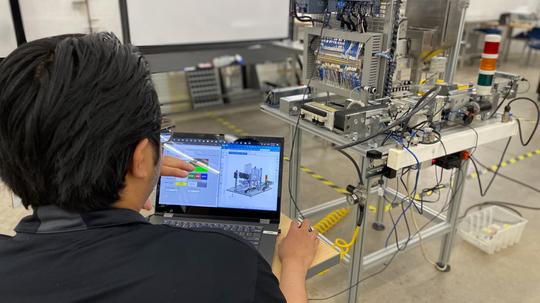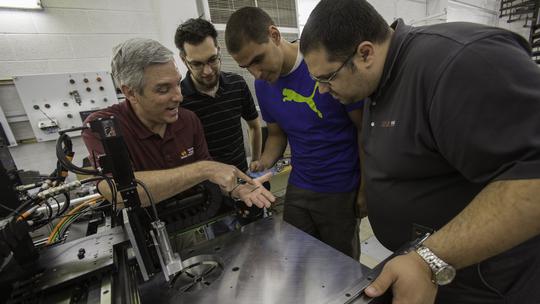
Manufacturing is ubiquitous in modern life. Our computers, our cars and many of the products we use daily are created using advanced manufacturing systems. To meet the needs of an increasingly high-tech landscape, existing manufacturing systems must evolve and engineering students must prepare for a technologically-enhanced future of work.
This is why the Ira A. Fulton Schools of Engineering at Arizona State University has launched the School of Manufacturing Systems and Networks, which opened its doors last fall and is now blossoming into a critical part of the seven Fulton schools.
The School of Manufacturing Systems and Networks integrates academic programs, faculty expertise and innovative research to address current and future challenges, improve sustainability and generate economic opportunities that will revitalize manufacturing in Arizona and beyond. The school will play a significant role in supplying the skilled talent needed to support U.S. efforts to reestablish its leadership in advanced manufacturing.
As one of the country’s largest and most comprehensive engineering schools, the Fulton Schools of Engineering is well positioned to lead industry-relevant research and technology innovation in the processes and systems that will drive the future of manufacturing.
“ASU’s record of innovation and leadership in engineering education puts us at the center of a national effort to accelerate advanced manufacturing and, in turn, to substantially improve competitiveness and innovation for a myriad of critical industries. This includes semiconductors and microelectronics, two areas that are vital to national security,” says Kyle Squires, ASU vice provost for engineering, computing and technology and dean of the Fulton Schools of Engineering.
Preparing students for factories of the future
“If you look across the country, there are more than 2 million manufacturing jobs that could go unfilled, and this particular school is trying to fill that workforce gap,” says Binil Starly, the inaugural director of the School of Manufacturing Systems and Networks.
Starly joins ASU after nine years as a North Carolina State University professor. There, he led the Data Intensive Manufacturing Environment Lab, or DIME, where he merged digital and physical technologies to advance discrete and continuous manufacturing processes.
Associate professor Dhruv Bhate has a heightened awareness of the looming manufacturing job deficit based on his prior engineering industry roles at Intel Corp. and PADT Inc.
“As we look forward and imagine the future of manufacturing, we have the opportunity to shape it in a more responsible way to advance humankind like never before,” says Bhate, a faculty member in the School of Manufacturing Systems and Networks.
Students in the school will develop their skills in modeling, automation, sensing, advanced manufacturing processes, robotics, human-machine teaming, machine learning, data optimization and digital twin systems, among other areas.

The School of Manufacturing Systems and Networks is located on ASU’s Polytechnic campus in Mesa, which is already home to programs in robotics and autonomous systems, information technology, human systems engineering and software engineering — an area Starly says will equip students with the information systems knowledge required to advance artificial intelligence on the factory floor.
Thomas Sugar, a professor and the associate dean of Barrett, the Honors College at the Polytechnic campus, is looking forward to working with faculty members in the new school.
“ASU is investing in professors that are experts in Industry 4.0,” he said. “This is crucial when building an advanced manufacturing ecosystem in Arizona where the Fulton Schools of Engineering will become the largest technical producer of talent in the U.S.”
Industry-centric environments provide authentic learning opportunities
The presence of new and existing Valley manufacturers investing in next-level technologies is already spurring opportunities for ASU and the Arizona workforce.
TSMC, the world’s largest semiconductor manufacturer, is investing $12 billion in a new chip-making plant in north Phoenix, while Intel and NXP Semiconductors are expanding their presence in the Valley.
Additionally, a growing electric vehicle industry, including Lucid Motors, Atlis Motor Vehicles, ElectraMeccanica and Nikola Motor, is adding to the prospective career options for students.
Seasoned collaborations with some of Arizona’s top manufacturing employers, such as Rockwell Automation, PADT Inc., Honeywell Aerospace, Pilgrim Aerospace Fasteners, Siemens, Raytheon Missiles and Defense, TPI Composites and Lallemand Baking will help foster the new school’s industry-forward mindset.
“We are trying to put the most advanced manufacturing technology in the hands of ASU students as soon as possible,” says Michael Cook, director of global academic enablement at Rockwell Automation, a company that provides industrial automation solutions to countries around the world. “In many institutions, there is a lag between when (students) adopt technologies and when they get integrated into the curriculum. The goal is to integrate the most current technologies so that program participants will graduate with the skills needed to meet the demands of the workplace.”
The School of Manufacturing Systems and Networks is poised to take on the challenge. Says Starly, “I’m looking forward to taking this school that’s in its initial stages and laying the groundwork so it has the foundation to grow at scale over the course of the next five to 10 years.”
Learn more at msn.engineering.asu.edu/.
Arizona State University serves almost 80,000 students across the Phoenix Metropolitan area and is ranked by U.S. News & World Report as the country's most innovative school. Since 2002, the university's mission has been to create a new model for higher education in the United States that meets the challenges of the 21st century.


